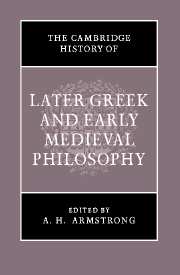Book contents
- Frontmatter
- Chapter 1 Introductory
- Part 1 GREEK PHILOSOPHY FROM PLATO TO PLOTINUS
- Part II PHILO AND THE BEGINNINGS OF CHRISTIAN THOUGHT
- Part III PLOTINUS
- Part IV THE LATER NEOPLATONISTS
- Part V MARIUS VICTORINUS AND AUGUSTINE
- Part VI THE GREEK CHRISTIAN PLATONIST TRADITION FROM THE CAPPADOCIANS TO MAXIMUS AND ERIUGENA
- Part VII WESTERN CHRISTIAN THOUGHT FROM BOETHIUS TO ANSELM
- Part VIII EARLY ISLAMIC PHILOSOPHY
- Chapter 39 Introductory
- Chapter 40 Al-Fārābī and his successors
- Select Bibliography
- Additional Notes and Bibliography
- Index of ancient and medieval works referred to in the text
- General Index
- Index of Greek terms
- References
Chapter 40 - Al-Fārābī and his successors
from Part VIII - EARLY ISLAMIC PHILOSOPHY
Published online by Cambridge University Press: 28 March 2008
- Frontmatter
- Chapter 1 Introductory
- Part 1 GREEK PHILOSOPHY FROM PLATO TO PLOTINUS
- Part II PHILO AND THE BEGINNINGS OF CHRISTIAN THOUGHT
- Part III PLOTINUS
- Part IV THE LATER NEOPLATONISTS
- Part V MARIUS VICTORINUS AND AUGUSTINE
- Part VI THE GREEK CHRISTIAN PLATONIST TRADITION FROM THE CAPPADOCIANS TO MAXIMUS AND ERIUGENA
- Part VII WESTERN CHRISTIAN THOUGHT FROM BOETHIUS TO ANSELM
- Part VIII EARLY ISLAMIC PHILOSOPHY
- Chapter 39 Introductory
- Chapter 40 Al-Fārābī and his successors
- Select Bibliography
- Additional Notes and Bibliography
- Index of ancient and medieval works referred to in the text
- General Index
- Index of Greek terms
- References
Summary
Life and writings: political philosophy
We know next to nothing about al-Fārābī's personal life. He preferred to be remembered by his work alone. He did not write an apologia pro vita sua, as Plato had done in antiquity and al-Rāzī among the Muslims and al-Ghazzālī after him, who described his own conversion to mysticism. Nor did he compose an autobiography for the use of a close pupil, like Avicenna, nor did any of his intimates record significant details of his life, as Porphyry had done in the case of his master Plotinus. The salient facts we have are these: al-Fārābī spent the greater part of his life in the capital of the Abbāsid caliphate, Baghdād, where he had come from his birthplace in a Turkish district of Transoxania; during his later years he stayed at the court of a minor Shi'ite ruler in Aleppo. He is supposed to have died as an old man a.d. 950.
Many of al-Fārābī's writings survived and were studied in the East until recent times. He wrote numerous elementary introductions to philosophical topics—like the later Greek treatises composed for beginners (τοις εισαγομενοις). Since he did not address a sophisticated audience which had been imbued with Greek philosophy for centuries, these treatises became more popular than we would be inclined to expect. He also wrote many monographs on special questions, as for instance on the One and the Intellect, on dreams and on various kinds of political associations, such works, apparently, being meant as preliminaries for more comprehensive studies. In addition, he composed commentaries on Aristotle's lecture courses in which he followed the late Greek way of interpreting Aristotle—which he knew from translations—without a gap.
- Type
- Chapter
- Information
- Publisher: Cambridge University PressPrint publication year: 1967
References
- 1
- Cited by

